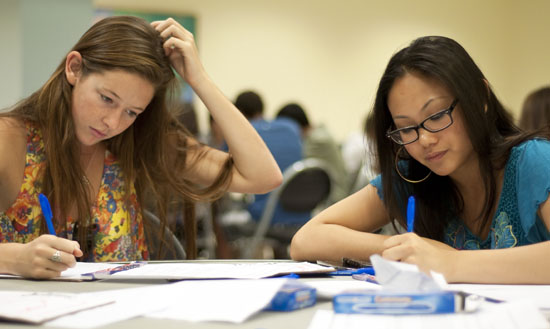When Keenan Jones wants to catch up with his stepfather, he tries to avoid video conferences. There’s a three-second delay in his stepfather’s Internet connection, and the video chat must be arranged months in advance.
Jones’ stepfather is in the U.S. Army, doing military intelligence work in Afghanistan in his sixth long-term deployment.
“I miss him a lot, but it’s gotten to the point where me and my mom can manage,” said Jones, a first-year undeclared engineering student. “It’s just a system we’re in.”
Jones is one of about 5,000 incoming first-years who are preparing care packages this summer for troops overseas.
During the last day of each orientation session, first-years listen to speeches by ROTC personnel and write letters to soldiers.
“I essentially said (in my letter) that I was a military brat. I understand what you guys (U.S. service members) are going through,” Jones said.
After the students finish writing, they join an assembly line, packing an Associated Students UCLA shopping bag with their letter, an iTunes gift card, UCLA apparel and a note asking the recipient to e-mail the Volunteer Center a picture of the service member wearing his or her new clothes.
The gifts were donated by Nacional Records and Campus Drive, a company that ASUCLA licenses to make clothing, said David Bloome, campaign director at the UCLA Volunteer Center.
“I was just thunderstruck, because it was like hitting a gold mine just when we needed it,” he said, referring to the more than-$100,000 clothing donation.
The new service project is sponsored by UCLA New Student and Transition Programs, the Volunteer Center and ROTC.
Adding outside help is Operation Gratitude, a nonprofit organization that aims to lift the morale of U.S. service members stationed abroad.
This is the first time Operation Gratitude has partnered with a university, Bloome said.
The UCLA Volunteer Center began in 2009 to promote service in the university’s community. The center hosted its first annual Volunteer Day last fall.
Bloome explained that although UCLA as a university has encouraged volunteering for many years, the center represents the first coordination of these efforts.
“Now we can finally look the student in the eye and say, “˜It’s not a question of participating, it’s how you participate,'” he said.
Incoming first-year chemistry student Lucy Duong said she was grateful to the military.
“I hope that whatever I’m doing with my major, I can help my community, too, but it’s never going to compare to (the armed forces) helping a whole country,” Duong said.
ROTC instructor Jason Davenport said that the new first-years have much in common with the soldiers who will receive their letters.
“A lot of the people (students are) writing to are in the same shoes ““ 18, 19 (years old) ““ maybe away from home for the first time,” Davenport said.
Students can choose to tell the service member their name and e-mail address if they want to keep corresponding.
Operation Gratitude asked letter-writers to maintain a positive, motivational tone and not to ask service members about death or killing. Bloome told students to keep their letters apolitical.
“We’re not trying to make any statements about war, or public policy, what’s right or wrong,” he told students before they began writing. “We’re simply reaching out.”
But as Jones stood in a crowd of students who’d completed their packages, America’s political choices were on his mind. He said he believes that service members such as his stepfather have an important peacekeeping role.
“The people in the military perform one of the most important jobs in the country, if not the world,” he said.
“They do it with pure intentions.”
Since 1919
